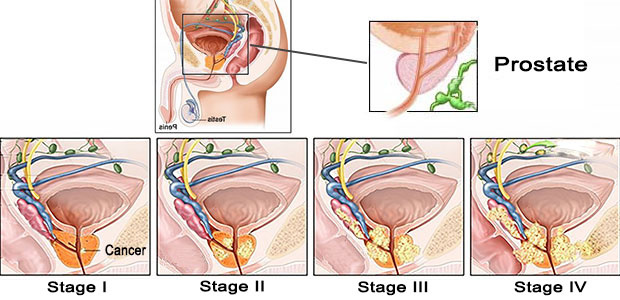Prostate Cancer Stage I: 90-95%;
Prostate Cancer Stage II: 60-70%;
Prostate Cancer Stage III: 30-40%;
Prostate Cancer Stage IV: 20%.
Tumor staging is closely related to survival, and early detection and timely treatment are important factors to improve the survival rate of prostate cancer. Only by identifying the stage of prostate cancer, oncologists can better develop treatment options. How is the prostate cancer specifically staged?
Prostate cancer staging helps choose treatment and evaluate prognosis. Staging is confirmed through DRE, CT, MRI, bone scanning, lymph node dissection and even PSA
1. T staging indicates the local condition of the primary tumor, which is mainly determined by the number and location of DRE, MRI and positive prostate puncture biopsy. Tumor pathological grade and PSA also can assist staging;
2. N staging indicates condition of lymph node, and only through lymph node dissection can accurately understand lymph node metastasis. CT, MRI and B-ultrasound can assist with N staging. It is important to choose a treatment method for N-stage patients;
3, M staging is mainly for bone metastasis, whole body radionuclide bone imaging, MRI, X-ray examination is the main method of examination. Once a diagnosis of prostate cancer is established, a whole-body radionuclide bone imaging test is recommended. If the radionuclide bone imaging finds a suspicious lesion and cannot confirm the diagnosis, MRI and other tests can be selected to confirm the diagnosis.

(The treatment plan for each stage of prostate cancer is for reference only and cannot be used as the sole basis for clinical treatment)
Stage 0 Prostate Cancer: Tis (in situ carcinoma), N0, M0 - a clinically insidious tumor that cannot be evaluated by primary tumors and cannot be detected by imaging;
Stage I Prostate Cancer: T1-T2a, N0, M0 - tumors confined to the prostate, invading one side of the prostate;
Treatment options for stage I prostate cancer: surgical resection, Combination of Traditional Chinese Medicine and Western Medicine;
Stage II Prostate Cancer: T2, N0, M0 - confined to the tumor in the prostate, invading one side or both sides of the prostate;
Treatment options for stage II prostate cancer: surgical resection, Interventional Therapy, Cryotherapy, Particle Implantation, Nanoknife, Microwave Ablation, Combination of Traditional Chinese Medicine and Western Medicine;
Stage III Prostate Cancer: T3, N0, M0 - the tumor breaks through the prostate capsule, reaching out of the capsule and invading the seminal vesicle;
Treatment options for stage III prostate cancer: Interventional Therapy, Cryotherapy, Particle Implantation, Nanoknife, Microwave Ablation, Combination of Traditional Chinese Medicine and Western Medicine;
Stage IV Prostate Cancer: any T stage, any N stage, M0-M1 stage - tumor fixation or invasion of adjacent tissue structures other than the seminal vesicle, such as bladder neck, external urinary sphincter, rectum, levator ani muscle and / or pelvic wall ;
Treatment options for stage IV prostate cancer: Interventional Therapy, Cryotherapy, Particle Implantation, Nanoknife, Microwave Ablation, Gene Targeted Therapy, Combination of Traditional Chinese Medicine and Western Medicine, Natural therapy.
Prostate Cancer Recurrence: Prostate cancer recurrence often occurs in the prostate, surrounding tissues, pelvic lymph nodes or other parts of the body;
Treatment options for prostate cancer recurrence : Interventional Therapy, Cryotherapy, Particle Implantation, Nanoknife, Microwave Ablation, Gene Targeted Therapy, Combination of Traditional Chinese Medicine and Western Medicine, Natural therapy.
We can offer help if you are diagnosed with prostate cancer. make an appointment online or contact reception for a telephone appointment. Call at 02-8-822122 (Manila Office) or 0917-599-2277 (Cebu Office) now.
Different stages of prostate cancer have different treatments. In St. Stamford Modern Cancer Hospital Guangzhou, our Multidisiplinary Team (MDT) will plan treatment for prostate cancer patients base on their body conditions and cancer stage, size and the location of the tumor. This will prevent prostate cancer patient from suffering surgery and side effects of chemotherapy and radiotherapy and extend their survival time.
 viber
viber